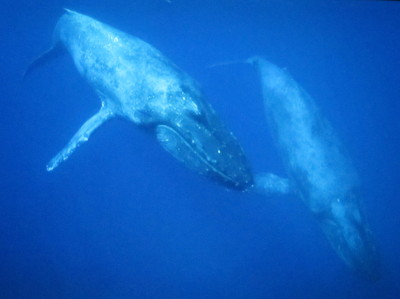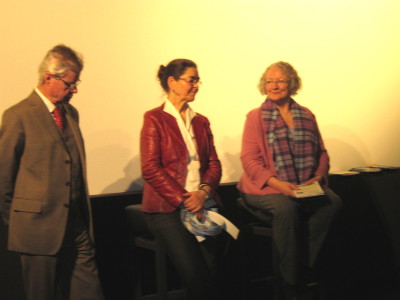 This year's Green Me film festival for sustainability in Berlin's CineMaxX had the ocean, life and water more in general as its central theme. Films for every taste and age group were screened and attracted the crowds.
This year's Green Me film festival for sustainability in Berlin's CineMaxX had the ocean, life and water more in general as its central theme. Films for every taste and age group were screened and attracted the crowds.
Supported by a large group of sponsors and partners ranging from food retail giant REWE to the Prince Albert II of Monaco Foundation and the German Marine Foundation the festival attracted lots of visitors to a rich selection of films in ten categories.
Judiciously programmed by Delphi Breger and guided by Festival Director Bernward Geier, the festival team had created a venue that radiated a caring and welcoming atmosphere complete with free biological food and soft drinks.
More than 40 documentaries, feature pictures and short films offered varied visual food complemented by a stream of panel discussions and presentations by film makers, experts and environmentalists interacting with the public. The ocean documentaries offered stunning pictures of the majestic giants of the seas, whales.
' The mystery of the humpback whales' directed by Daniel Opitz was projected out of the competition. It traces long-term research of James Darling, who studies the behaviour and songs of the remaining approximately 8000 humpbacks in the waters of Hawaii, where they gather to breed and give birth to their calves and where the males sing their mysterious and ever changing songs. This is about half the remaining global population of humpbacks. Underwater videography by Charles Nicklin of National Geographic produces stunning images of these placid 40 ton leviathans. Peace gets interrupted by the occasional fight among bulls chasing elusive females and using all kinds of tricks out outsmart their rivals. Emitting enormous air bubble curtains to separate their rivals from the female they seek to impress shows their prowess.
The mystery of the humpback whales' directed by Daniel Opitz was projected out of the competition. It traces long-term research of James Darling, who studies the behaviour and songs of the remaining approximately 8000 humpbacks in the waters of Hawaii, where they gather to breed and give birth to their calves and where the males sing their mysterious and ever changing songs. This is about half the remaining global population of humpbacks. Underwater videography by Charles Nicklin of National Geographic produces stunning images of these placid 40 ton leviathans. Peace gets interrupted by the occasional fight among bulls chasing elusive females and using all kinds of tricks out outsmart their rivals. Emitting enormous air bubble curtains to separate their rivals from the female they seek to impress shows their prowess.
“Ocean Giants” directed by Mark Brownlow expands on this topic as part of the competition. It shows awesome images of humpbacks in Hawaii, right whales in Argentina, a female grey whale with her calf off Baja California on their dangerous way to feeding grounds in Alaska, where they get attacked by a school of orcas, shy and little researched Greenland whales in the Arctic that can attain an age of more than 200 years and the placid blue whales off Sri Lanka, the biggest animals on Earth. Particularly the underwater photography by Dough Allan and Didier Noirot is an important support for behavioural researchers trying to cast light on the lives of these intelligent marine mammals. After relentless hunting for two centuries up to World War II several species are coming slowly back from the brink of extinction. But populations are a far cry of their earlier abundance after more than 300,000 individuals of these intelligent, slow-breeding and long-lived species have been hunted for short-term profit. Few people realise how important these whales are as gardeners of ocean ecosystems essentially fertilising the sea and culturing their own food.
 “Shark Girl”, a prize-winning documentary at the 2014 nature film festival Green Screen, accompanies Madison Steward in her quest to protect her beloved sharks from extinction. Used to swim with sharks since childhood, 20 year-old Madison worries about the progressive disappearence of sharks along the Great Barrier Reef in her native Australia and other parts of the ocean, where they get relentlessly fished for shark fin and as cheap food. Reefs without sharks are unhealthy and less biodiverse. The film traces her quest to debunk the fears many humans have of sharks. In her explorations she also discovers that shark fins contain harmful molecules and their flesh can be loaded with dangerous levels of mercury making the consumption of shark fin soup and shark meat distinctly uncool if not a health hazard.
“Shark Girl”, a prize-winning documentary at the 2014 nature film festival Green Screen, accompanies Madison Steward in her quest to protect her beloved sharks from extinction. Used to swim with sharks since childhood, 20 year-old Madison worries about the progressive disappearence of sharks along the Great Barrier Reef in her native Australia and other parts of the ocean, where they get relentlessly fished for shark fin and as cheap food. Reefs without sharks are unhealthy and less biodiverse. The film traces her quest to debunk the fears many humans have of sharks. In her explorations she also discovers that shark fins contain harmful molecules and their flesh can be loaded with dangerous levels of mercury making the consumption of shark fin soup and shark meat distinctly uncool if not a health hazard.
In the stream of conferences and panel discussions the German Marine Foundation (Deutsche Meeresstiftung) had invited Prof. Hartmut Grassl, long-standing director of the Max Planck Institute for Meteorology, Dr. Cornelia E Nauen, president of Mundus maris, and Gesine Meissner, MEP since 2009 and president of the parliament's Intergroup Seas, Rivers and Coastal Areas. Ably moderated by Frank Schweikert, the panel discussed contemporary challenges to the ocean and climate and what could be done to ensure a healthy planet for this and future generations. The panel's exchanges with the audience and its key messages will shortly be posted on the website of the German Marine Foundation.
Photo by Cornelia E Nauen. For more information on the programme, jury and prizes, check the festival website.








